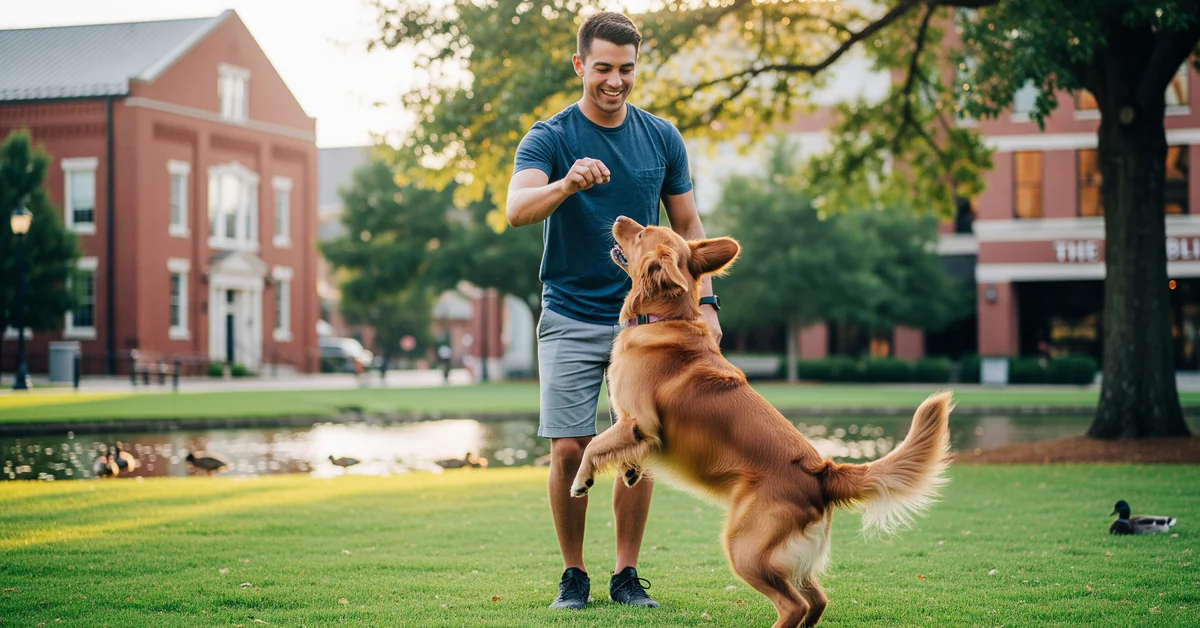Your Complete Guide to Choosing a Dog Trainer in Huntsville
Finding the right dog training in Huntsville can feel like a big step, but it’s a rewarding journey for both you and your canine companion. This guide focuses on what dog owners in Huntsville need to know when looking for local dog trainers, covering everything from local regulations to what to expect from training costs and methods. We want to help you make an informed choice for your furry friend.
How to Choose the Right Trainer
Choosing a dog trainer in “Rocket City” means looking for someone who understands your dog’s specific needs and your training goals. It’s not just about teaching commands; it’s about building a stronger bond and fostering better behavior. Consider what kind of training services you need, whether it’s basic obedience, puppy training, or help with behavioral issues. A good trainer will create a personalized training plan.
Look for a trainer who uses positive reinforcement methods. This approach focuses on rewarding desired behaviors, which helps your dog learn without fear or intimidation. It builds confidence and makes the learning process enjoyable. Ask about their experience training dogs similar to yours, and if they have experience with specific training needs like reactivity or separation anxiety.
For help finding reputable trainers in your area, the AKC’s Dog Trainer Search Tool allows you to search by zip code for trainers nationwide – including Huntsville. Many trainers listed here hold widely recognized certifications and agree to follow AKC guidelines for humane, effective training.
Many professional dog trainers hold certifications from recognized organizations. These certifications, like CPDT-KA or KPA-CTP, show a trainer has met certain standards of knowledge and skill. You can learn more about these different dog trainer certifications to understand what each one represents. While not legally required in Alabama, they can offer peace of mind.
Common Dog Training Methods Explained

Dog training methods vary, but understanding a few common approaches can help you decide what fits your philosophy. The most widely accepted and effective method for most dogs is positive reinforcement. This involves rewarding good behavior with treats, praise, or toys. It encourages your dog to repeat actions they get rewarded for.
This is often the foundation for basic manners and obedience training. For more insight into positive reinforcement with videos, articles, and detailed explanations, Karen Pryor Academy’s Positive Training Resource Center is a reputable source used by many leading trainers nationwide.
Another approach focuses on behavior modification. This is often used for more complex behavioral issues like aggression or extreme fear. A skilled trainer will identify the root cause of the behavior and develop a plan to change your dog’s emotional response. This can sometimes involve desensitization and counter-conditioning techniques. Both private dog training and group training classes can incorporate these methods, depending on the individual dog’s needs.
Some trainers might focus on specific programs like Canine Good Citizen preparation, which teaches excellent manners for dogs in the community. No matter the method, the goal is always to achieve better behavior and a well-adjusted dog.
Average Cost of Dog Training in Huntsville (Updated for 2025)
The cost of dog training services in the Huntsville and Madison County area can vary significantly based on the type of training, the trainer’s experience, and the length of the program. Here’s an estimated breakdown to help you budget for your dog’s training journey.
| Service Type | Average Cost (Huntsville Area) |
|---|---|
| Group Classes | $150 – $300 (4-6 sessions) |
| Private Sessions | $80 – $160 per hour session |
| Puppy Training | $150 – $275 (4-6 sessions) |
| Board & Train | $1,200 – $3,500 (2-4 weeks) |
Keep in mind that these are averages, and some specialized training programs, like those for service dog or therapy dog preparation, may be higher. Many trainers offer packages that can reduce the per-session cost. Always ask for a clear breakdown of costs and what’s included in any training plan.
Questions to Ask a Potential Dog Trainer
When you’re ready to find a dog trainer in Huntsville, asking the right questions is key. This helps you understand their approach, experience, and ensure they’re a good fit for you and your pup. The Association of Professional Dog Trainers (APDT) offers a detailed guide on interviewing trainers, including red flags and recommended questions. Consult their guide for a checklist of topics to cover and tips on spotting quality trainers.
- What training methods do you use, especially for obedience training?
- What are your dog trainer certifications and qualifications?
- How long is a typical training session, and how many are usually needed for my specific goals?
- Do you offer both private dog training and group classes?
- How do you handle specific behavioral issues like leash pulling, excessive barking, or reactivity?
- Can you provide references from past clients in the Huntsville area?
- What is your policy on make-up sessions or refunds?
- Are you insured, and what kind of insurance do you carry?
- What is your philosophy on positive reinforcement?
Local Huntsville Resources for Dog Owners
Huntsville, Alabama, provides several resources and dog-friendly locations that can support your dog training needs and overall canine well-being. Knowing about these local spots can help with socialization and provide opportunities to practice new skills in real-world environments.
When considering dog training, it’s also important to be aware of local regulations. The City of Huntsville has a leash law stating that dogs must be on a leash no longer than six feet when off the owner’s property. This helps ensure safety for both dogs and people in public spaces.
Madison County also has similar regulations in unincorporated areas. For detailed information, you can always check with Huntsville Animal Services, which oversees animal welfare and control within the city.
Alabama does not have specific licensing or certification requirements for general dog trainers, but all businesses operate under general state and local business laws. It’s always a good idea for professional dog trainers to carry general liability insurance.
The Huntsville area has many pet-friendly shops and outdoor areas where well-behaved dogs are welcome. Always look for “Dogs Welcome” signs or call ahead to confirm. Huntsville Animal Services is also a key local resource for lost pets, adoptions, and general animal care information. Here are some great resources to discover where you can take your dog:
- Huntsville Dog Parks: Official list of parks and trails you can bring your dog.
- Dog Friendly Locations: The Huntsville / Madison County Convention & Visitors Bureau list of dog-friendly places

FAQs
Are there leash laws in Huntsville?
Yes, the City of Huntsville requires dogs to be on a leash no longer than six feet when they are off their owner’s property and in public areas. This rule helps keep both pets and people safe.
Do dog trainers need to be licensed in Alabama?
No, there are no specific state, county, or city licensing or certification requirements unique to dog trainers in Alabama. However, professional trainers typically obtain standard business licenses and often pursue voluntary certifications to demonstrate their expertise.
Where can I take my dog in Huntsville for socialization?
Huntsville offers several excellent dog parks, like Shaggy’s Dog Park at South Side Park, Northeast Park Dog Park, and Kids’ Space Dog Park. These provide safe, designated areas for dogs to interact and improve their socialization skills.
What kind of training is best for a new puppy in Huntsville?
For a new puppy, puppy training services that focus on basic obedience, house-training, socialization, and preventing common behavioral issues are ideal. Group classes for puppies can be particularly beneficial for early socialization.
How long does dog training take?
The duration of dog training varies greatly depending on the dog’s age, temperament, specific training goals, and the owner’s commitment. Basic obedience or puppy training might involve a few weeks of classes, while addressing complex behavioral issues can take several months of consistent work.
